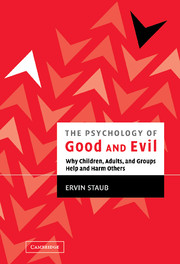Book contents
- Frontmatter
- Contents
- Preface
- Acknowledgments
- PART I INTRODUCTION AND CORE CONCEPTS
- PART II THE ROOTS OF HELPING OTHER PEOPLE IN NEED IN CONTRAST TO PASSIVITY
- 6 Helping a Distressed Person: Social, Personality, and Stimulus Determinants
- 7 Spontaneous (or Impulsive) Helping
- 8 Social and Prosocial Behavior: Personal and Situational Influences and Their Interactions
- 9 The Power to Help Others: Report on a Psychology Today Survey on Values, Helping, and Well-Being
- PART III HOW CHILDREN BECOME CARING AND HELPFUL RATHER THAN HOSTILE AND AGGRESSIVE
- PART IV THE ORIGINS OF GENOCIDE, MASS KILLING, AND OTHER COLLECTIVE VIOLENCE
- PART V THE AFTERMATH OF MASS VIOLENCE: TRAUMA, HEALING, PREVENTION, AND RECONCILIATION
- PART VI CREATING CARING, MORALLY INCLUSIVE, PEACEFUL SOCIETIES
- Appendix: What Are Your Values and Goals?
- Index
- References
6 - Helping a Distressed Person: Social, Personality, and Stimulus Determinants
Published online by Cambridge University Press: 07 May 2010
- Frontmatter
- Contents
- Preface
- Acknowledgments
- PART I INTRODUCTION AND CORE CONCEPTS
- PART II THE ROOTS OF HELPING OTHER PEOPLE IN NEED IN CONTRAST TO PASSIVITY
- 6 Helping a Distressed Person: Social, Personality, and Stimulus Determinants
- 7 Spontaneous (or Impulsive) Helping
- 8 Social and Prosocial Behavior: Personal and Situational Influences and Their Interactions
- 9 The Power to Help Others: Report on a Psychology Today Survey on Values, Helping, and Well-Being
- PART III HOW CHILDREN BECOME CARING AND HELPFUL RATHER THAN HOSTILE AND AGGRESSIVE
- PART IV THE ORIGINS OF GENOCIDE, MASS KILLING, AND OTHER COLLECTIVE VIOLENCE
- PART V THE AFTERMATH OF MASS VIOLENCE: TRAUMA, HEALING, PREVENTION, AND RECONCILIATION
- PART VI CREATING CARING, MORALLY INCLUSIVE, PEACEFUL SOCIETIES
- Appendix: What Are Your Values and Goals?
- Index
- References
Summary
introduction
There is an ancient and continuing human ideal which prescribes that people should help and do good for others. This ideal is communicated to us in many ways; in churches and schools, in family and community life, the moral imperative to aid our less fortunate or suffering fellows is often held up as one of the basic human values. Unquestionably, people's willingness to help each other is of great importance both for individuals and for the harmonious functioning of the social group. The consequences of not helping a person in need can be fatal for him or her. But just as important is the effect on the welfare of a whole society, on its social climate. What would life be like, what kind of relationships would we have with other people, and what would be our feelings toward them, if we could not count on anyone when we are in trouble?
Philosophers have long been concerned with the bases and origin of the individual's goodness toward his fellow man. Socrates believed that man is capable of goodness: he can become good through self-examination, which leads to knowledge of virtue, which in turn will lead to virtuous action. Hobbes, on the other hand, viewed the individual as self-seeking, and needing strong external controls that would compel him to inhibit harmful actions and force him to do things that would benefit others.
- Type
- Chapter
- Information
- The Psychology of Good and EvilWhy Children, Adults, and Groups Help and Harm Others, pp. 71 - 99Publisher: Cambridge University PressPrint publication year: 2003



